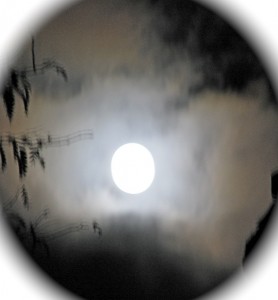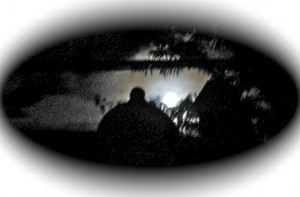(Harvest Moon over the Schenectady Stockade, Sept. 15, 2008)
.. . . Issa Self-portrait with poem ..
. . Issa Self-portrait with poem ..
“Gimme that harvest moon!”
cries the crying
child
.. by Kobayashi Issa, translated by David G. Lanoue .. 
A cold front is moving into Schenectady today, after a sultry weekend that simply did not jibe with tonight’s arrival of the Harvest Moon (which is the full moon closest to the autumn equinox and has traditionally added extra light to farmers toiling to bring in the Fall harvest). You can’t love and write haiku without being under the influence of the Harvest Moon, and f/k/a has celebrated this special lunar event annually with an array of haiku and senryu:
- “this moon’s for you!“ (featuring Issa haiku, 2004)
- “more harvest moon haiku“ (2004)
- “don’t forget to look up“ (2005)
- “looking up: harvest moon & justin’s clouds” (2006)
- “moon cakes, harvest moons & more“ (2007)
- “in case you’re missing tonight’s Harvest Moon” (2007)
[Harvest Moon over Schenectady, NY, Sept. 15, 2008; dag] 
As Professor David G. Lanoue reminds us:
“The night of the harvest moon–the full moon nearest to the autumn equinox–is, along with New Year’s Day and the blooming of cherry blossoms, one of the top three most important dates in a haiku poet’s calendar.”
Indeed, a search for “harvest, moon” at Lanoue’s Haiku of Kobayshi Issa website produces a bumper crop of 65 poems by Japan’s beloved 19th Century haiku master, translated by our haijin friend and Honored Guest poet David G. Lanoue of Xavier University in New Orleans (read about David’s return home after Katrina). And, it should be no suprise, then, that “Harvest Moon” very much means both “Issa” and “Lanoue” for the f/k/a Gang.
Therefore, although you can find many Harvest Moon-themed poems by our other Honored Guests by clicking on the links listed above from prior years, today we want to focus on Issa and Lanoue.
..  .. .. Kobayashi Issa and translator Prof. David G. Lanoue . . .
.. .. Kobayashi Issa and translator Prof. David G. Lanoue . . .  . .
. .
Along with translations of over 9000 of Issa’s poems, Prof. Lanoue pften provides commentary to explain the verses, putting them into context of Japanese culture and history, as well as Issa’s life. Below, then, are some of my favorite Issa Harvest Moon poems, with a few Lanoue commentaries to illuminate our journey and our moon-gazing tonight. We hope you enjoy them as much as we do.
not only waiting
for the harvest moon to rise…
streetwalker
..  ..
..
harvest moon night–
instead of the moon
leaking rain
harvest moon–
digging in the teacup
for sake money
harvest moon-gazing
priests, samurai
merchants
. .. the heavens don’t allows cooperate: 
harvest moon
on a clear, rainless night
elsewhere!
.名月やけふはあなたもいそがしき
meigetsu ya kyô wa anata mo isogashiki
harvest moon–
tonight even you
are busy!
Commentary: Is Issa implying that the moon is occupied with business elsewhere and therefore is unable to appear (i.e. it’s a cloudy night).
. . . In 1819, there was an eclipse on the night of the Harvest Moon, and Kobyashi Issa wrote often about it.
overly helpful–
the harvest moon
eclipse forecaster
harvest moon–
my lap would be a pillow
if my child were here
Commentary: This haiku was written in Seventh Month, 1819. Its biographical context is important, because Issa’s daughter, Sato, born the previous year, died of smallpox in Sixth Month of 1819–just a few weeks before Issa composed this poem. As he sits looking at the harvest moon–one of the most joyful occasions in the calendar for a haiku poet–the happy occasion is marred by a palpable absense. If only Sato were here… This sad poem reminds us of how precious children are to us; how, without them, the wonders of the universe, even the resplendent moon, seem drab and ordinary.
lit by the harvest moon
no different…
trashy house
Of course, sometimes we’d rather sleep than moon-gaze ..  ..
..
the harvest moon
over mountain and river…
while I sleep
on harvest moon night
greeting the moon…
with snores
. . . . Does the Man in the Moon know it’s an Election Year?
harvest moon–
even in Kyoto
growing old
Commentary: The “capital” (miyako) was Kyoto in Issa’s day. This is where the emperor and his court lived. Sakuo Nakamura notes that the full moon in decline over Kyoto might have a political dimension: “authority in ancient time all has gone away,” as the center of power in Japan has moved from imperial Kyoto to the Shogun’s city, Edo (Tokyo).
harvest moon–
I tell you it’s cold
on Shinano Mountain!
the harvest moon
hangs over it…
rice cake gift
harvest moon–
wherever you are
someone’s annoyed
the harvest moon
drifts with the tide…
a little boat
harvest moon–
Sumida River thick
with mosquitoes
harvest moon-
fifty seven years
of traveling autumns
 .壁穴に我名月の御出哉
.壁穴に我名月の御出哉
kabe ana ni waga meigetsu no oide kana
hole in the wall–
my harvest moon
comes in
Commentary: This haiku reminds us of one composed in 1813:
looking pretty
in a hole in the paper door…
Heaven’s River
Thematically, both poems belong to his “natural riches amid human poverty” group. Issa’s screen is torn, but through it he sees the Milky Way. And, his wall has a hole, but through it he sees the moon. In both cases, rips and holes–signs of poverty–are revealed to be lucky, for they allow celestial beauty into the hovel. This haiku is one of the “essential” 188 picked by the translator.
mountain village–
even in my soup
the harvest moon
harvest moon–
in the seat of honor
a katydid chirrs
harvest moon
on the mountain scarecrow’s
sleeve
harvest moon–
on a stone a teacup
filled with sake
in the harvest moonlight
unruffled, unaffected
scarecrow
next to the roof beam
shining bright…
harvest moon
.名月や家より出て家に入
meigetsu ya ie yori dete ie ni iru
harvest moon–
going out
going back in
Commentary: [I]n 1811, two years before he wrote this poem, Issa summarizes 49 years of poetry with the phrase, “moon! blossoms!” (tsuki hana ya), spring’s blossoms and autumn’s harvest moon being the essential subjects of haiku. It’s surprising and humorous, then, to see him walk outside, take a quick, obligatory look at the moon, then walk back in. The humor cuts at least two ways. Issa makes fun of himself, showing himself to be impatient and unwilling to open his heart and absorb the beauty of the moon. And, he makes fun of poets who make a big deal about the harvest moon. After all, the moon is the moon all year long, with at least eleven other nights of perfect fullness. The ultimate humor of the haiku derives from the fact that, despite Issa’s quick, perfunctory glimpse at the moon, he does, after all, write a nice little poem. This haiku is one of the “essential” 188 picked by the translator.
harvest moon–
sitting cross-legged
like the Buddha
p.s. Talk about traditions: 
a nightlight
for our Gulf Coast friends –
Harvest Moon 2005
. . . . . . . . . . . . by dagosan

i especially like the streetwalker haiku. :D witty stuff. :)
Comment by kouji — September 16, 2008 @ 2:34 am
Good morning, Kouji. Thanks for leaving a trio of Comments. It seems you have a preference for naughty poems and titillation. But, don’t we all.
Comment by David Giacalone — September 16, 2008 @ 7:31 am